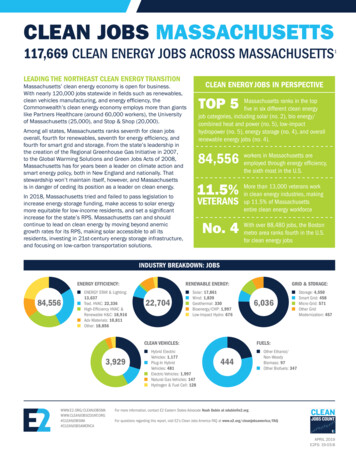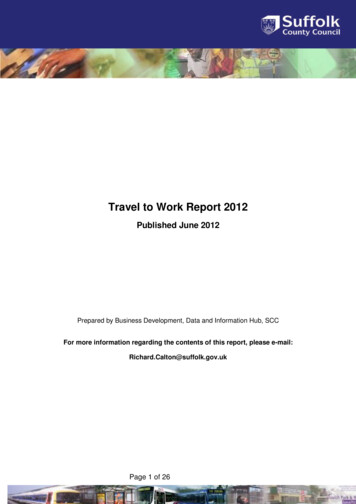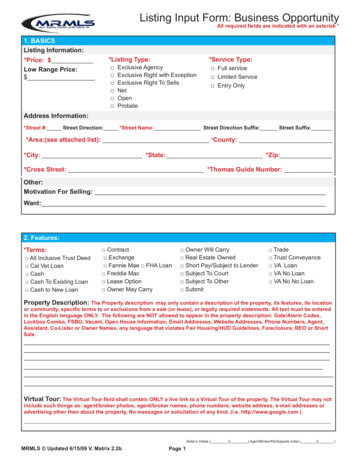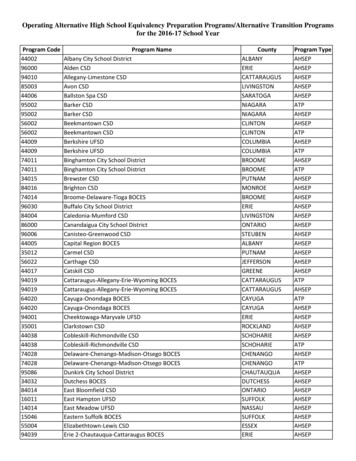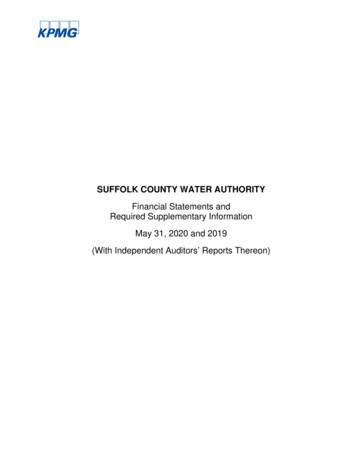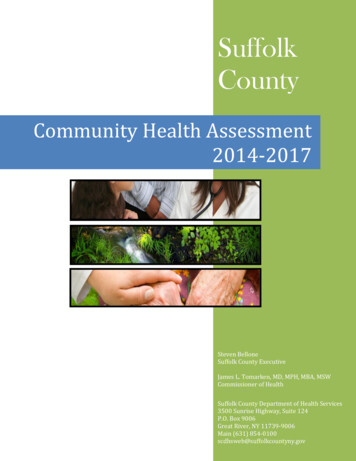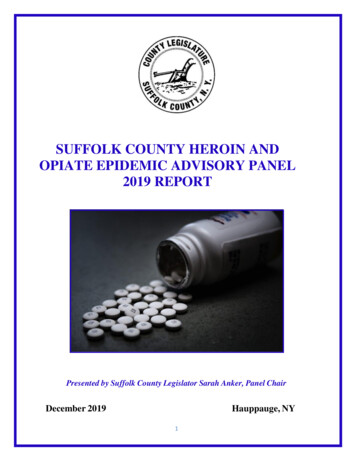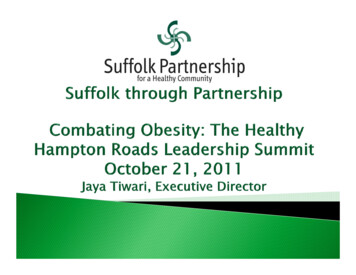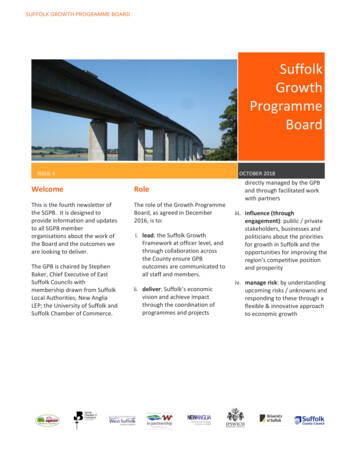
Transcription
SUFFOLK GROWTH PROGRAMME BOARDSuffolkGrowthProgrammeBoardISSUE 4OCTOBER 2018WelcomeRoleThis is the fourth newsletter ofthe SGPB. It is designed toprovide information and updatesto all SGPB memberorganisations about the work ofthe Board and the outcomes weare looking to deliver.The role of the Growth ProgrammeBoard, as agreed in December2016, is to:The GPB is chaired by StephenBaker, Chief Executive of EastSuffolk Councils withmembership drawn from SuffolkLocal Authorities; New AngliaLEP; the University of Suffolk andSuffolk Chamber of Commerce.i. lead: the Suffolk GrowthFramework at officer level, andthrough collaboration acrossthe County ensure GPBoutcomes are communicated toall staff and members.ii. deliver: Suffolk’s economicvision and achieve impactthrough the coordination ofprogrammes and projectsdirectly managed by the GPBand through facilitated workwith partnersiii. influence (throughengagement): public / privatestakeholders, businesses andpoliticians about the prioritiesfor growth in Suffolk and theopportunities for improving theregion’s competitive positionand prosperityiv. manage risk: by understandingupcoming risks / unknowns andresponding to these through aflexible & innovative approachto economic growth
SUFFOLK GROWTH PROGRAMME BOARDUpcoming eventsIt’s a busy time of year for all staff here are just a few of the upcoming events that the SGPB is delivering,sponsoring or t Suffolk Business Festival2 (for 10 days)Suffolk Design staff workshop5SGPB meeting12Building foundations for the future – housing conference16thSuffolk Chamber Transport & Infrastructure Board16thSuffolk Skills Show17LGA Procurement masterclass19Lakenheath procurement event22Suffolk Design Roundtable (2)23Procurement training for firms24Suffolk Design (Roundtable (3)29East Suffolk Business Festival29 (for 10 days)Local Energy East workshop2NALEP Building Growth Group8Suffolk Design Roundtable (4)14Biodiversity conference22SGPB Funding & Finance seminar23Procurement training for firms29 / 30Transport East partnership forum17SGPB meeting21ndththththndrdthththndththndrdththstth
SUFFOLK GROWTH PROGRAMME BOARDISSUE 4OCTOBER 2018Our programmes & projects - Report back!Further detail on all our programmes and projects is available from the Partnership Manager or any of the SGPBrepresentatives. The following summaries report back on key aspects of some of the work we are currentlyundertaking and how it will be taken forward.Suffolk Design – a full programme of events is underway andour first survey has been launched on our website:www.suffolkdesign.ukOur first Roundtable was held at Christchurch Mansion,Ipswich focusing on “good growth”. Some quotes from theday .“We need to rethink how to engage communities. Too often itis late and based on tick boxes. It needs to be open and early.”“Evidence base is there but deliverability in the end wins whichis not necessarily good growth. but how do we push forwardmost sustainable sites rather just the deliverable ones?”“My experience of where the masterplanned process hasworked well we rarely get objections from local community bythe time it gets to planning application. The local communityhas been significantly engaged at masterplan stage.”“Agree the home is changing, rapidly. We need to plan fordifferent demographics and an ageing population. Above allwe need to shift the discussion to be about homes rather thanhouses; the delivery of detached houses is an inefficient use ofland.”Going forwardDelivering the Suffolk Design programme is the first step indeveloping and embedding a new approach to design andcommunity engagement across the planning system. Thiswork is not simply a planning project though and to besuccessful will require buy-in across all elements ofdevelopment, those in the public sector and private industry.The wider the input we can gain during the next 6 months thebetter the outcome will be.the skills gaps need to be more of a priority with thesector being made a more attractive career option.Building Growth Group (NALEP): Utilities workshopth20 SeptemberAn interesting day run by the Building Growth Group.Attendees were Local Authorities, Utility Companies and afew developers. There were 4 workshops looking at:1.Regulations and whether they are barriers toproductivity. It was agreed that improved clarity wasneeded and that ideally there would be commonregulations between different utility companies.2.Relationships and how the barriers should be addressed(more transparency, information sharing, openness andcontinuity). It was agreed that more strategic dialoguewould be useful and a utilities event should be heldannually.3.Resourcing (staffing shortages, lack of communicationand lack of understanding about different roles). It wasagreed that there could be a fast-track option (focussedteams for strategic sites), collaborative partnerships and4.Funding – requires innovative thinking: a paradigm shiftfor new technology for construction rather than justcontinuing building using the old methods; a mechanismfor sharing financial risk; an enabling fund could be usedto make infrastructure more investable.Going forwardEnsuring we can deliver the utilities we need to enable growthis crucial if we are to achieve our aim of investing in enablinginfrastructure in advance of development. A furtherndworkshop is scheduled for 2 November at Endeavour Houseto consider strategic priorities and local needs. Staffattending the workshop are asked to complete this shortthsurvey before Friday 5 iewform
SUFFOLK GROWTH PROGRAMME BOARD2F%2Fwww.suffolkchamber.co.uk%2F&usg AOvVaw1bT3KGaCra0GxEXAMf5S7MA review of public sector procurement – our survey of firmsSummary of key business survey findings: The surveygenerated a high response level (391 firms) and wasrepresentative by company size and market sector of thebusiness community across Suffolk. A high percentage ofrespondents had tendered for public sector contracts and ofthese over half were successful.Quotes from the SurveyKey results:“It is just too difficult to be recognized for procurement whenyou are small and you lack support as well as the experience.”(Micro business – education and training)--A broad spread of business sectors represented, with thelargest being construction and development, businessconsultancy and management, training and education,ICT, tech and digital and advanced manufacturing andengineering160 organisations (41% ) had begun the tender processfor public sector contracts in the last five years (34%completed the process, 7% started but did not complete)-Overall, 66 organisations reported that they had beenawarded a contract-Respondents tendered to a wide range of public sectorbodies, with 54% doing so to Suffolk County Council and36% to a borough or district council-18% reported tendering to ‘other’. On examination, thesefall into three main categories: separately listed publicsector bodies - usually councils, sub contracts forproviders of services to public sector bodies and out ofcounty public sector organisations-There was no one overwhelming individual barriers orgroup of barriers identified, suggesting that there is abroad based perception of a range of challenges thathave been or could be encountered in tendering forpublic sector contracts-159 organisations suggested they’d be interested inattending a workshop about overcoming barriers tobidding with the vast majority leaving their contactdetails for our follow-up-WE ARE DELIVERING A SERIES OF TRAINING EVENTS FORFIRMS BASED ON THE FEEDBACK RECEIVEDhttps://www.google.com/url?sa t&rct j&q &esrc s&source web&cd 1&cad rja&uact 8&ved 2ahUKEwjiuq2WwuXdAhUMCsAKHe8eDekQFjAAegQIBRAD&url https%3A%“The tender system is confusing as you cannot delete oldtenders and the new tenders do not come in order so you haveto trawl through pages and pages of tenders.” (Mediumbusiness - transport, freight and logistics)“Excessive bid costs, caused by uncertain requirements,extended timescales, lack of information and uncertaindecision timescales are the most significant barrier to biddingin our experience.” (Micro business – construction anddevelopment)Going forwardOur procurement work will be brought together in an ActionPlan to be taken forward by the SGPB & CWPG. Our aim is tobetter understand how we can impact on the local economythrough procurement. This could include:-additional training to ensure firms are “fit to bid”-improved promotion of opportunities and / or betterpublisicing of large contracts that have been awarded andmay require additional input from sub-contractors / otherfirms in the Suffolk supply chain-joint tendering opportunities across the public sector, e.g.can we generate a greater economic impact bycoordinating our tender opportunities and minimising thetime firms spend bidding for similar contracts? How dowe balance this with ensuring appropriate competition?-improved processes and systems for procurementresulting in more efficient working practices across thepublic sector-sector specific initiatives, e.g. with construction firms, tobetter understand Suffolk’s supply chains and theircapacity to respond. This work would link with a numberof skills development programmes that are being takenforward across the region.
SUFFOLK GROWTH PROGRAMME BOARDOur outcomesOur work programme is designed to contribute tothe following growth outcomes: Secure investment to deliver infrastructure thatwill enable development to the longer termbenefit of Suffolk’s communities and businesses Create a consistent, efficient, and transparentapproach to planning to improve land supply Make Suffolk an optimal location for commercialinnovation, investment, and business expansion Meet clearly identified skills, employment andeconomic development needs Deliver the homes that Suffolk needs to matchcurrent and future demand. Operate system wide approach to funding andfinance supporting place based initiatives overthe medium and long termRegional workingRecent and upcoming regional meetings and groupsthat SGPB attends to either support Members and / orensure alignment of, and contribution to, the deliveryof our growth ambitions include:Most Active County(MAC) Strategic Group: Suffolk’s Director of PublicHealth & Protection has established a new StrategicGroup to take forward the MAC partnership (whichwas moved to the Public Health Directorate in 2017).The GPPM has been invited to join the StrategicGroup and ensure the work of GPB is aligned withMAC initiatives aimed at improving levels of physicalactivity across Suffolk and contributing to our wider,shared, inclusive growth ambitions. The secondmeeting is scheduled for 14th December.Economic Strategy Coordinating Delivery BoardNALEP has established a Coordinating Delivery Boardto develop and oversee the implementation of theEconomic Strategy for Norfolk & Suffolk. This Boardwill also oversee the development of the LocalIndustrial Strategy. Board members, drawn fromNorfolk & Suffolk include: Chambers, FSB, CBI, DistrictChief Executives, County Economic DevelopmentDirectors, Growth Board representatives. The Board iscurrently considering how to demonstrate & reportprogress against the Economic Strategy and how theuncertainty of Brexit should be reflected.Transport EastSGPB provides officer support to Members onTransport East – the sub national transport bodyacross the Eastern region of England.Transport East meets 4x per annum the officer groupto develop the TE strategy based on the 3 key themesof: Ports & Airports / connecting our centres of growth/ coastal port-east-forum/Growth Programme Board Staff &RepresentativesListed below are the organisations and individuals onGrowth Programme Board. Please contact any ofthese representatives to find out more about the roleand work of GPB and understand how our work alignswith that of your team / organisation.Chair: Stephen Baker, Chief Executive East SuffolkCouncils, Growth Lead for Suffolk AuthoritiesGrowth Programme Partnership Manager: KarenChapman
SUFFOLK GROWTH PROGRAMME BOARDISSUE 4Babergh Mid Suffolk District Councils: Tom Barker,Assistant Director Planning for Growth; Phil Isbell,Corporate Manager Growth & Sustainable PlanningEast Suffolk Councils: Philip Ridley, Head of Planning /Paul Wood, Head of Economic DevelopmentIpswich Borough Council: Martyn Fulcher, Head ofDevelopment; Michelle Gordon, EconomicDevelopment Project ManagerNew Anglia Local Economic Partnership: Chris Starkie,Chief Executive OfficerOCTOBER 2018Suffolk County Council: Jai Raithatha, Head ofEconomic Development; / John Pitchford, Head ofPlanning / Sue Roper, Assistant Director StrategicDevelopment / Andrea Wood, Head of SkillsUniversity of Suffolk: Tim Greenacre, RegistrarWest Suffolk Councils: Andrea Mayley, Head ofService, Economic DevelopmentSuffolk Constabulary and colleagues fromCambridgeshire / Peterborough have an openinvitation to attend all meetings of SGPB.Suffolk Chamber of Commerce: Nick Burfield, Directorof PolicyOUR NEXT NEWSLETTER WILL BE PUBLISHED JANUARY 2019FOR MORE INFORMATIONPlease contact Karen Chapman, karen.chapman@eastsuffolk.gov.ukIf you wish to unsubscribe from the newsletter please contact Karen.
Suffolk Councils with membership drawn from Suffolk Local Authorities; New Anglia LEP; the University of Suffolk and Suffolk Chamber of Commerce. to economic growth Role The role of the Growth Programme Board, as agreed in December 2016, is to: engagement) i. lead: the Suffolk Growth Framework at officer level, and through collaboration across
